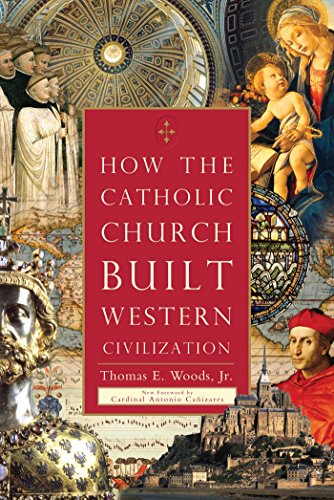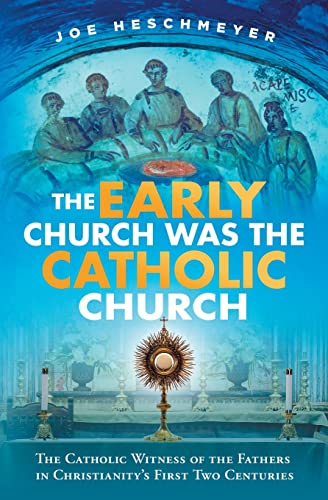VATICAN CITY –– Pope Francis has died today, aged 88.
The Holy See Press Office announced the news, writing:
A short while ago, His Eminence Cardinal Farrell announced with sorrow the death of Pope Francis with these words:

How the Catholic Churc…
Best Price: $8.00
Buy New $9.06
(as of 05:30 UTC – Details)
“Dear brothers and sisters, it is with deep sorrow that I must announce the death of our Holy Father Francis.
At 7:35 this morning, the Bishop of Rome, Francis, returned to the Father’s house. His entire life was dedicated to the service of the Lord and His Church.
He taught us to live the values of the Gospel with fidelity, courage, and universal love, especially toward the poorest and most marginalized.
With immense gratitude for his example as a true disciple of the Lord Jesus, we commend the soul of Pope Francis to the infinite merciful love of the Triune God.”
Pope Francis’s health had been steadily declining in recent months. He had suffered persistent breathing problems through the winter and was admitted to Rome’s Gemelli hospital on February 14 for bronchitis but was then diagnosed with double pneumonia in what was first described as a “complex” then a “critical” medical scenario. He suffered a number of respiratory crises and failures and presented with symptoms of “mild” kidney failure during his hospitalization. Discharged back to the Vatican after 38-days, Francis began a 2-month convalescence as his doctors revealed he nearly lost his life twice in the spring hospitalization.
He was last in public on Easter Sunday to give the Urbi et Orbi blessing, but looked notably weak, being barely able to raise his arms and with a particularly strained voice.
The Argentinian prelate had led the Catholic Church as Pope since March 13, 2013. He emerged to the world as a surprise successor to Benedict XVI, following the German Pope’s shock resignation in February 2013.
Jorge Mario Bergoglio was ordained on December 13, 1969 and was raised to become Auxiliary Bishop of Buenos Aires in May 1992, before assuming control of the see in 1998. Created cardinal by Pope John Paul II in February 2001, he served as the vice-president and then president of the episcopal conference of Argentina from 2002 – 2011.
In the papal conclave following Benedict XVI’s resignation, Cardinal Bergoglio was elected to the Papal throne on March 13, 2013, at the age of 76.
Styled as the “pope of confusion” by commentators, his reign was marked by a rapid diversion from Catholic teaching on numerous issues, with his pronouncements and writings leading to widespread confusion amongst Catholics on topics such as LGBT issues, divorce and “re-marriage,” nature of the priesthood, role of the laity in ecclesial governance, adherence to Tradition, and the permissibility of the traditional Latin Mass.
Indeed, the issues arising from his pontificate do not end here, since they also include the gutting of the Pontifical Academy for Life and re-filling it with supporters of abortion; the championing of “climate change” and globalist policies; the promotion of taking abortion-tainted COVID-19 injections as a moral duty; pushing an irreligious concept of “human fraternity” which was widely accused of rejecting God and subsequently welcomed by Muslims and Freemasons; being involved in the reported cover-up of a number of high-profile abuse cases, such as Father Marko Ivan Rupnik, Bishop Gustavo Zanchetta, ex-cardinal Theodore McCarrick; remaking the Vatican curia with individuals noted for their rejection of Catholic teaching on numerous points.
Pope Francis: A bishop from ‘the ends of the earth’
Announced as the 266th Pope of the Catholic Church on March 13, 2013, Cardinal Jorge Mario Bergoglio was elected on just the second day of the conclave. Many have argued that his election was a result of a longstanding and coordinated plan by the secretive St. Gallen group or mafia. (More details on his election are provided further below in this obituary).
Citing concern for the poor as his reason, Bergoglio chose the new papal name of Francis in imitation of St. Francis of Assisi. Addressing the crowds in St. Peter’s Square on the evening of his ascent to the throne, Francis avoided using the term “Pope,” presenting himself instead as “bishop” of Rome. “You know that it was the duty of the Conclave to give Rome a Bishop. It seems that my brother Cardinals have gone to the ends of the earth to get one… but here we are… I thank you for your welcome. The diocesan community of Rome now has its Bishop.”
His appearance on the balcony of St. Peter’s was notable for its departure from tradition: gone were the Pope’s red shoes which symbolized martyrdom; gone were the Papal pectoral cross and ring, with Bergoglio choosing his own instead; gone also was the traditional red mozzetta.
He also dispensed with the usual order of a papal blessing, asking the assembled crowd to pray for him, before imparting a blessing.
The evening was a revelatory one, with many commentators already remarking on the new Pope’s disregard for customs.
He created over 140 cardinals in nine consistories through his reign, and issued well over 3,500 documents, texts or speeches. Among this number were 4 Encyclicals: Lumen Fidei, largely written by Pope Benedict and finished by Francis; Fratelli Tutti, which expounded a form of irreligious fraternity dubbed as “blasphemous”; Laudato Si’, which advocated for “climate change” measures and formed the basis for his future ecological writings and interventions; Dilexit Nos, on the Sacred Heart.
Pope Francis also penned 74 Motu Proprios, 92 Apostolic Letters, 7 Apostolic Exhortations, 20 Apostolic Constitutions, and one Papal Bull. Francis made over 40 official papal trips outside of Italy and visited 65 countries as of September 12, 2024.
Traditional Latin Mass
One of the most notable and impactful aspects of Francis’ tumultuous pontificate is his attack on the Church’s traditional Mass, which was affected over a number of years. His July 16, 2021, motu proprio Traditionis Custodes abrogated Pope Benedict’s 2007 Summorum Pontificum, declaring that the liturgy of Pope Paul VI, or the Novus Ordo, is the “unique expression of the lex orandi of the Roman Rite.”
The immediate fallout of the text saw closure of traditional Masses in various locations around the world. It was supposedly born out of a survey by the Congregation for the Doctrine of the Faith (CDF), which claimed devotees of the traditional Mass fostered “disagreements,” ruptures in the Church, and the “peril of division.”
However, the implementation of the restrictions was not swift or widespread enough, prompting Francis’ perfect of the Congregation for Divine Worship (Cardinal Arthur Roche) to issues increased restrictions in December 2021, followed by yet more restrictions in February 2023. The results of the CDF’s survey were never published, and are believed never to have been seen by Roche’s dicastery implementing the restrictions.

The Early Church Was t…
Best Price: $6.86
Buy New $9.00
(as of 03:24 UTC – Details)
Canonists have argued that Traditionis Custodes itself was not canonically legal, and prelates such as Cardinals Raymond Burke, Robert Sarah and Bishop Athanasius Schneider repeatedly spoke out against the papal moves. Schneider has stated that to comply with the restrictions would be a “false obedience,” Sarah decried them as “diabolical,” and Burke styled them as being a “persecution.”
By virtue of these various documents against the traditional Mass, Francis thus ordered traditional Masses out of parish churches, forbade newly ordained priests from automatically being able to say the traditional Mass, limited the number of priests already with that permission, restricted the use of the traditional sacraments, and removed diocesan bishops’ powers to exempt their priests from the papal restrictions.
In addition to this, the Pontiff repeatedly took aim at devotees of Tradition, describing them as “rigid” and highlighting this as a problem related to “clericalism.” In one such characteristic discussion, Francis argued that devotion to the traditional Mass was a “nostalgic disease” resulting in “indietrism.”
In a quasi-autobiographical book published in January 2025, Francis also accused Catholics who attend the traditional liturgy of having a “mental imbalance, emotional deviation, behavioral difficulties, a personal problem that may be exploited.”
Indeed, further restrictions on the traditional Mass had been rumored to be enacted over the summer of 2024, with Francis reportedly having the document on his desk ready to sign. But following an outpouring of public support from groups and individuals, the rumored text never emerged.














